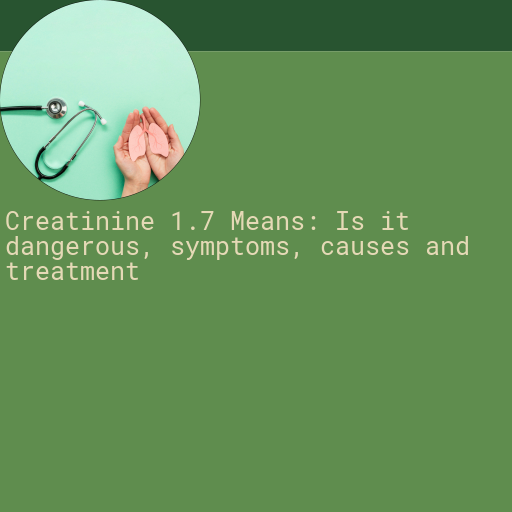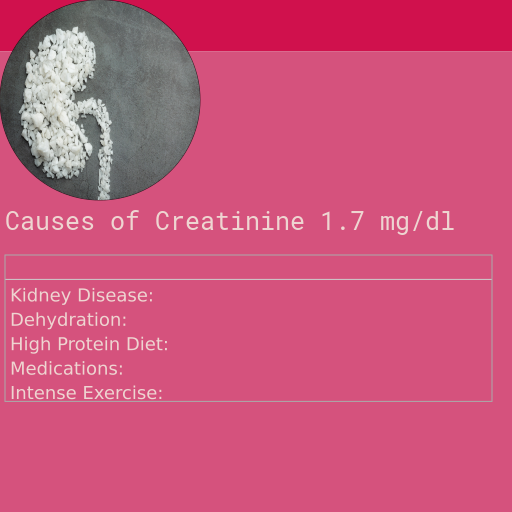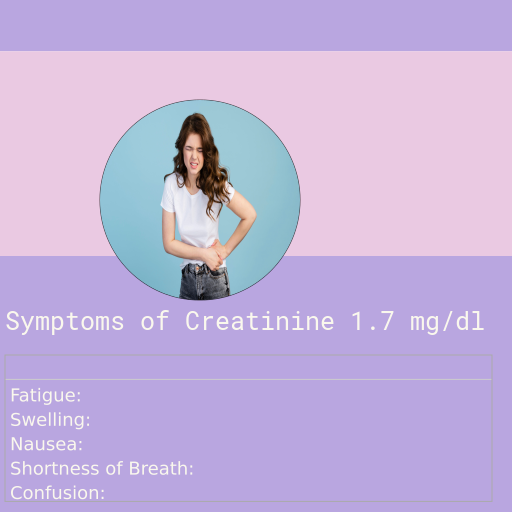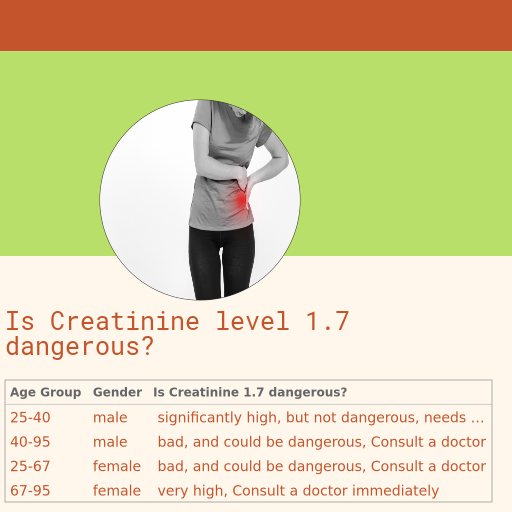Creatinine 1.7 : Is it Dangerous, Causes, Symptoms and More
Understanding the significance of creatinine levels in your body is crucial for maintaining optimal health. Creatinine, a waste product generated from muscle metabolism, is filtered out by the kidneys. When these levels rise, it may indicate underlying health issues. A creatinine level of 1.7 can be a red flag, signaling potential kidney dysfunction or other medical conditions. This blog will delve into the dangers associated with elevated creatinine levels, explore their causes and symptoms, and discuss the available treatment options to help you manage and mitigate health risks effectively.

What is Creatinine
Creatinine is a byproduct of protein breakdown, specifically from muscle metabolism, and it is considered a waste product that has no useful function in the body. Once produced, creatinine enters the bloodstream and is then filtered out by the kidneys, eventually being excreted in the urine. Maintaining appropriate levels of creatinine is crucial, as elevated levels can indicate potential kidney dysfunction or other underlying health issues. Understanding the role of creatinine as a mere waste product helps underscore the importance of kidney health in effectively eliminating it from the body.
- Muscle Metabolism: Creatinine is a byproduct of muscle metabolism. When muscles use creatine for energy, creatinine is formed as a waste product.
- Dietary Intake: Consuming meat and other animal products can contribute to creatinine levels because these foods contain creatine, which converts to creatinine in the body.
- Kidney Function: The kidneys filter creatinine out of the blood. Impaired kidney function can lead to higher creatinine levels.
- Medications: Certain medications can affect creatinine levels by either increasing creatinine production or affecting kidney function.
- Dehydration: Lack of adequate hydration can concentrate creatinine levels in the blood.
- Exercise: Intense physical activity can temporarily elevate creatinine levels due to increased muscle metabolism.
Normal Range of Creatinine in Adults
The normal range of creatinine in adults can vary slightly depending on the laboratory and the method used for testing, but generally, it falls between 0.6 to 1.2 milligrams per deciliter (mg/dL) for men and 0.5 to 1.1 mg/dL for women. Creatinine levels can be influenced by factors such as age, muscle mass, and overall health. It's essential to understand that values outside this range may indicate potential kidney issues or other health concerns, warranting further medical evaluation.
| Age Group | Creatinine Normal Range (mg/dL) |
|---|---|
| Infants (0-1 year) | 0.2 - 0.4 |
| Children (1-12 years) | 0.3 - 0.7 |
| Adolescents (13-18 years) | 0.5 - 1.0 |
| Adults (Male) | 0.6 - 1.2 |
| Adults (Female) | 0.5 - 1.1 |
| Elderly (60+ years) | 0.6 - 1.3 |
Causes of Creatinine 1.7
Understanding the causes of elevated creatinine is crucial for determining the appropriate treatment and management strategies. Elevated creatinine levels can be an indicator of various underlying health issues, including kidney dysfunction, dehydration, and even certain medications that can affect kidney function. Additionally, conditions such as high blood pressure and diabetes can also lead to increased creatinine levels. Recognizing these causes can help in early diagnosis and prompt intervention, potentially preventing more serious health complications.
- Kidney Disease: Chronic kidney disease or acute kidney injury can significantly elevate creatinine levels as the kidneys lose their ability to filter waste effectively.
- Dehydration: Severe dehydration can reduce blood flow to the kidneys, causing a temporary spike in creatinine levels.
- High Protein Diet: Consuming large amounts of protein can increase creatinine production, as creatinine is a byproduct of muscle metabolism.
- Medications: Certain medications, such as nonsteroidal anti-inflammatory drugs (NSAIDs) and some antibiotics, can impair kidney function and elevate creatinine.
- Intense Exercise: Vigorous physical activity can temporarily raise creatinine levels due to increased muscle breakdown.
- Heart Conditions: Congestive heart failure and other heart conditions can lead to reduced blood flow to the kidneys, affecting their function.
- Urinary Tract Obstruction: Blockages in the urinary tract, such as kidney stones or an enlarged prostate, can impede urine flow and elevate creatinine.
- Rhabdomyolysis: This serious condition involves the breakdown of muscle tissue, releasing a large amount of creatinine into the bloodstream.

Symptoms of Creatinine 1.7
When creatinine levels rise, it can indicate underlying health issues, often related to kidney function. Elevated creatinine might not produce immediate symptoms, but over time, you may experience signs such as fatigue, swelling in the extremities, changes in urination, and shortness of breath. Recognizing these symptoms early is crucial for timely diagnosis and effective treatment.
- Fatigue: Feeling excessively tired or weak.
- Swelling: Noticeable swelling in the face, hands, feet, or ankles.
- Nausea: Experiencing persistent nausea or vomiting.
- Shortness of Breath: Difficulty in breathing or feeling breathless.
- Confusion: Experiencing confusion or trouble concentrating.
- Muscle Cramps: Frequent muscle cramps or spasms.
- High Blood Pressure: Elevated blood pressure levels.
- Changes in Urination: Alterations in the frequency or appearance of urine.

Dangers of Creatinine 1.7
Creatinine is a waste product produced by muscles during the breakdown of a compound called creatine. While creatinine itself does not directly affect the body, elevated levels of creatinine in the blood can be a sign of underlying health issues, most notably kidney failure or other kidney-related problems. High creatinine levels indicate that the kidneys are not functioning properly and are unable to filter out waste products efficiently. As a result, other harmful waste substances like urea can accumulate in the body, leading to various adverse effects on overall health.
- Kidneys: Elevated creatinine levels can indicate kidney dysfunction, leading to reduced ability to filter waste from the blood.
- Heart: High creatinine can be a sign of potential cardiovascular diseases, including increased risk of heart failure and hypertension.
- Liver: Though less common, elevated creatinine can also be associated with liver diseases such as cirrhosis, affecting overall metabolism and detoxification.
- Muscles: Increased creatinine levels may result from muscle damage or disorders, which can cause muscle pain and weakness.
- Brain: High levels can contribute to neurological issues, including confusion, cognitive impairment, and even seizures.
- Lungs: Elevated creatinine might be linked to pulmonary issues, like shortness of breath or fluid in the lungs, often due to associated heart or kidney problems.
- Digestive System: High creatinine can lead to gastrointestinal problems such as nausea, vomiting, and loss of appetite.
- Skin: Increased levels can cause skin issues like dryness, itching, and a higher susceptibility to infections due to impaired waste removal.
Home remedies for Creatinine 1.7
Disclaimer: Elevated creatinine levels are indicative of potential kidney issues and should not be treated at home. Professional medical evaluation is essential for accurate diagnosis and appropriate treatment. While awaiting professional care, basic supportive measures such as staying hydrated, maintaining a balanced diet, and avoiding strenuous activities can help support kidney function. However, these are not substitutes for medical intervention and should only be considered as temporary measures until you can see a healthcare provider.
- Stay Hydrated: Drinking plenty of water helps your kidneys filter waste. Aim for at least 8 glasses a day unless otherwise advised by your healthcare provider.
- Monitor Diet: Follow a kidney-friendly diet. Limit foods high in potassium, phosphorous, and sodium. Opt for fresh fruits and vegetables.
- Avoid Overuse of Painkillers: Non-prescription painkillers like ibuprofen can harm your kidneys if taken excessively. Use them sparingly and consult your doctor.
- Exercise Regularly: Engage in moderate physical activity such as walking or yoga to improve overall health and kidney function. Aim for at least 30 minutes a day.
- Limit Alcohol and Quit Smoking: Both habits can further damage your kidneys. Reducing or eliminating alcohol and quitting smoking can improve kidney health.
Treatment for Creatinine 1.7
When faced with a creatinine level of 1.7, seeking medical treatment by a doctor is crucial. The primary treatment goals include stabilizing kidney function, which may involve various interventions to ensure the kidneys are working efficiently. Additionally, it is essential to stop any harmful drugs that may be contributing to kidney impairment. Another critical aspect is treating any underlying infections that could be exacerbating the condition. By addressing these key areas, healthcare providers aim to manage and potentially reverse the elevated creatinine levels, thereby improving overall kidney health.
- Hydration: Increasing your water intake can help to flush out toxins and reduce creatinine levels.
- Dietary Adjustments: Reducing protein intake and avoiding foods high in potassium and phosphorus can ease the burden on your kidneys.
- Medication: Certain medications can help manage underlying conditions such as high blood pressure or diabetes, which may contribute to elevated creatinine levels.
- Lifestyle Changes: Regular exercise, quitting smoking, and reducing alcohol intake can improve overall kidney function and lower creatinine.
- Medical Treatments: In some cases, treatments like dialysis may be necessary to filter waste from the blood if the kidneys are severely impaired.
GFR with Creatinine of 1.7
When evaluating kidney function, the Glomerular Filtration Rate (GFR) is a more comprehensive measure than the absolute value of creatinine. GFR estimates how much blood passes through the glomeruli—tiny filters in the kidneys—each minute. This measure accounts for various factors such as age, sex, and body size, providing a personalized assessment of kidney health. In contrast, creatinine levels can fluctuate based on muscle mass, diet, and hydration status, making them less reliable as a standalone marker. Therefore, while a creatinine level of 1.7 mg/dL might raise concerns, understanding its impact requires examining the GFR to get a clearer picture of kidney function and potential risks.
| GFR Grade | GFR Range (mL/min/1.73 m²) | Kidney Function | Implications |
|---|---|---|---|
| G1 | ≥ 90 | Normal or High | Kidney function is normal. No signs of kidney damage. |
| G2 | 60-89 | Mildly Decreased | Kidney function is slightly reduced. Often no symptoms. |
| G3a | 45-59 | Mild to Moderate Decrease | Early signs of kidney damage. May require monitoring and lifestyle changes. |
| G3b | 30-44 | Moderate to Severe Decrease | Noticeable decline in kidney function. May need medical treatment and more frequent monitoring. |
| G4 | 15-29 | Severely Decreased | Severe loss of kidney function. Preparation for potential kidney replacement therapy (dialysis or transplant) may be necessary. |
| G5 | < 15 | Kidney Failure | Kidney function is very poor or has stopped. Usually requires dialysis or a kidney transplant. |
What is my GFR for a creatinine of 1.7
| Age | Gender | GFR |
|---|---|---|
| 18 | male | 52.76 ml/m2 |
| 45 | male | 43.8 ml/m2 |
| 60 | male | 41.32 ml/m2 |
| 80 | male | 38.97 ml/m2 |
| 18 | female | 39.15 ml/m2 |
| 45 | female | 32.5 ml/m2 |
| 60 | female | 30.66 ml/m2 |
| 80 | female | 28.92 ml/m2 |
Table of danger posed by Creatinine 1.7 in male across different ages
| Age Group | Is Creatinne of 1.7 dangerous? |
|---|---|
| 25yrs - 40 yrs | significantly high, but not dangerous, needs attention |
| 40yrs - 95 yrs | bad, and could be dangerous, Consult a doctor |
Table of danger posed by Creatinine 1.7 in female across different ages
| Age Group | Is Creatinne of 1.7 dangerous? |
|---|---|
| 25yrs - 67 yrs | bad, and could be dangerous, Consult a doctor |
| 67yrs - 95 yrs | very high, Consult a doctor immediately |

Which other tests should be done for a creatinine value of 1.7?
While understanding the implications of a creatinine level of 1.7 is crucial, it's equally important to look at other diagnostic tests to get a comprehensive view of kidney function and overall health. Tests like electrolytes, which measure levels of sodium, potassium, chloride, and bicarbonate, can provide critical information about your body's fluid balance and metabolic state. A renal profile typically includes blood urea nitrogen (BUN) and eGFR (estimated glomerular filtration rate), offering deeper insights into kidney performance. Additionally, assessing blood gas levels can reveal important information about the body's acid-base balance and oxygenation status, which are vital for diagnosing and managing various medical conditions. Together, these tests help paint a fuller picture, ensuring that any underlying issues are promptly identified and addressed.
- Electrolytes: This test measures levels of essential minerals like sodium, potassium, and chloride in your blood. Imbalances can indicate issues with kidney function or other metabolic disturbances.
- Renal Profile: A comprehensive panel that includes tests like Blood Urea Nitrogen (BUN) and Glomerular Filtration Rate (GFR) to provide a detailed assessment of kidney health and function.
- Blood Gas Levels: Analyzes the oxygen and carbon dioxide levels in your blood, along with pH balance. Abnormalities can suggest metabolic or respiratory issues, often linked to renal dysfunction.
- HbA1c: This test measures your average blood glucose levels over the past 2-3 months. Elevated levels can indicate diabetes, which is a significant risk factor for kidney disease.
- Liver Enzymes: Tests like ALT, AST, and ALP provide insights into liver function. Since the liver and kidneys work closely to detoxify the body, abnormalities here can also affect renal health.

 By: Dr.Bhargav Raut
By: Dr.Bhargav Raut